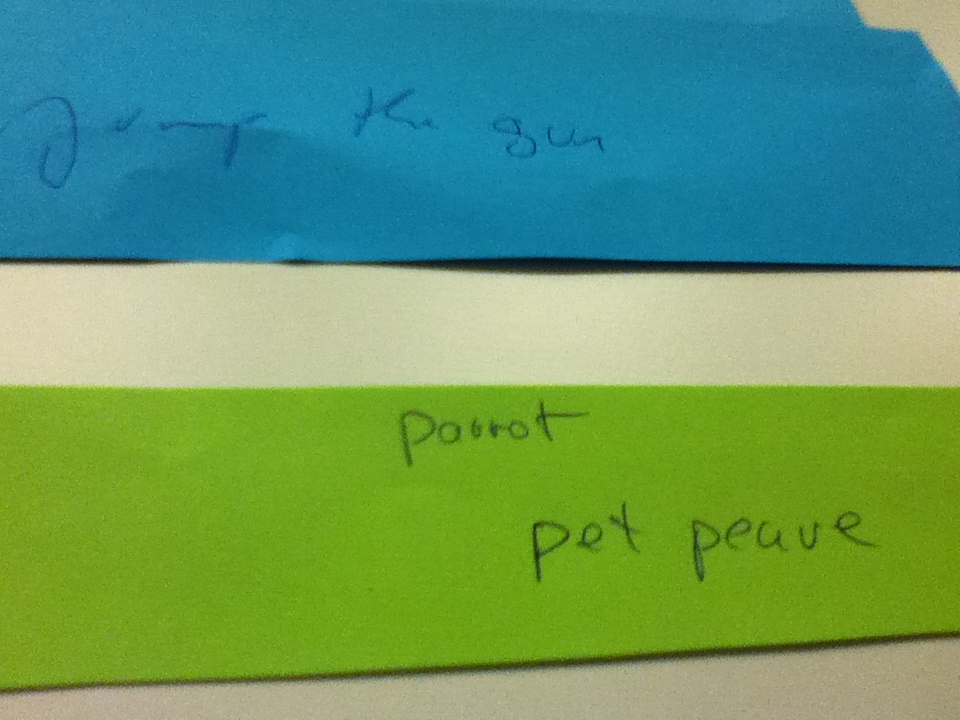This week’s lesson was a bit of dog’s dinner. The activities I’d planned around the syllabus were:
- Revise Useful phrases (game)
-
Talk about/ plan next week’s lesson
-
Grammar Test (Revise use of perfect tenses)
-
Article on Leadership/ Reporting questions
I wasn’t completely happy with the lesson as it just didn’t fit together. I think I relied too much on the texts I brought to class and didn’t focus enough on conversation and real tasks. In other words, I think I made a bolt for Centralised Teaching as I was actually very short on time!
But I was very happy with the learners and the way they were responding to the new approach.
What happened?
First we talked about next week’s lesson and what film we were going to discuss. One learner in the class had sent me a big list of films and articles that he was interested in discussing. This was a first for me – I can’t remember the last time learners suggested and then came up with real class activities! During the discussion, it was decided that people should watch a film at home and then come in and use the class to discuss it (I promise, I didn’t mention ‘flipped classroom’ once, really).
The choices were:
Boy A – Story of Boy A who is released from prison after killing a child years earlier.
Four Lions – A black comedy about a group of hapless terrorists from the North of England.
Sherlock – The new BBC version of the Conan Doyle classic.
These films contain a lot of ‘adult’ themes and language, especially Boy A and Four Lions – quite different from the normal run-of-the-mill textbook topics. In the end, the group chose the first Sherlock episode ‘A Study in Pink’. They also organised to have the film on USB which would be distributed so they could all watch it – which was great for me, a lot less hassle to organise!
Next, revising the Useful phrases went well. We played a game where I read a definition of the phrase and the learners, in two groups, had to write down the phrase on a strip of paper. The first group to hold up the correct answer gets a point! Below you can see ‘jump the gun’ and ‘pet peave’ (peeve).
Two steps backward
The rest of the lesson wasn’t too successful. I’d previously sent a grammar test to the learners but only some of the learners received the email or remembered getting it. I knew that perfect tenses were sometimes a problem so I had an exercise from an Advanced coursebook to practise the Use of Perfect tenses, especially using Simple vs. Continuous forms.
Finally, we looked at an article on ‘Leadership’ entited ‘We need fewer leaders on podiums and more ordinary superheroes.’ There was some useful vocabulary here, like ‘humble’, ‘to do a stint’ and ‘to take a punt’ but opinion was divided over social entrepreneurs. For example, is it ok for ‘social’ businesses or charities to make money? What’s the difference between social entrepreneurs and business entrepreneurs?
As the article was an interview with a social entrepreneur, I asked the learners to put the questions into reported speech. This was actually an idea taken from a OneStopEnglish article by Lindsay Clandfied and Kerry Maxwell. To be honest, I actually tied myself in knots here as Reported Speech doesn’t lend itself to easy explanations and the questions in the interview were way too difficult! For example, how would you report this question:
What have you found most challenging about leadership?
Would you change the tense back in time (Present to Past perfect) or just use the past simple?
Answers in the comments section, please. Start with ‘He was asked….’
Ok, so the lesson wasn’t perfect, I relied too much on imported materials and I fluffed the grammar explanation. Such is life.
Well, not to worry, next week is Sherlock!
